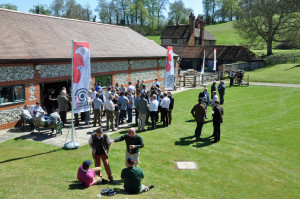BUS recently received the following request from Genetic Alliance for a rare disease awareness campaign that they are running. We are posting this letter in case any of our UK based members would like to tell their story to publicise Birdshot Uveitis and help raise the profile. Continue reading
Pharmaceutical market research – help required
BUS received the following request (see extract below) and spoke to Persephone Newsholme to find out a little more about this Market Research which is for a pharmaceutical company. Continue reading
Birdshot and the Carrots Night walk
Sight loss and vision charities come together to fundraise at the Carrots NightWalk and support new eye research. Continue reading
Magnificient Shoot Result – £55,882 !
 Stimulated by the sparkling form of guest auctioneer, Jeffery Archer and the generosity of those who attended, the fabulous sum of £55,882 was raised on the inaugural Birdshot Uveitis charity clay pigeon shoot. Continue reading
Stimulated by the sparkling form of guest auctioneer, Jeffery Archer and the generosity of those who attended, the fabulous sum of £55,882 was raised on the inaugural Birdshot Uveitis charity clay pigeon shoot. Continue reading
Cast your vote please !
Where should the next UK Birdshot Day be held?
We’d like to canvass your opinion on where the next Birdshot Day should be held? The date we are aiming for is March 2015.
To keep it simple we have 3 suggestions to choose from with the opportunity for you to make your own suggestion if preferred.
It’s a bit of an experiment as we have never used this software before, but do please do cast your votes and let us know which of the following locations you would prefer.
Many thanks
The Birdshot Team
Helping educating future optometrists about Birdshot
BUS helped at the Fight for Sight Optometry Examinations by sending along Birdshotters to be examined by future optometrist. Many of the students had never heard of Birdshot Uveitis, so it was a great opportunity to get them better acquainted with the eye condition.
Birdshot is difficult to diagnose even for experienced ophthalmologist because the tell tale lesions do not necessarily appear straight away. But it is useful for optometrists to know a bit more about it, that floaters, flashings and inability to see in the dark, a failed field test for example,might be a sign of something more serious going on in the eye that needs to be referred to a specialist for further tests.
Top 10 Priorities for Ocular Inflammatory Diseases
The Sight Loss and Vision Priority Setting Partnership Survey in 2012 asked patients, carers and eye health professionals to identify unanswered questions about the prevention, diagnosis and treatment of sight loss and eye conditions that they wished to see answered. A number of Birdshot Uveitis Society members took part in this survey and raised many interesting questions. Continue reading
Research News – May 2013
A recent paper (1) confirmed the previous finding (2) of the involvement of the T helper 17 (th17) cells in birdshot. Th17 cells are associated with autoimmune diseases and are also involved in diseases such as ankylosing spondylitis and behcet disease (also associated with uveitis).
(1)Yang P, Foster CS. Interleukin 21, Interleukin 23, and Transforming Growth
Factor β1 in HLA-A29-Associated Birdshot Retinochoroidopathy. Am J Ophthalmol.
2013 Apr 23. doi:pii: S0002-9394(13)00168-2. 10.1016/j.ajo.2013.03.004.
(2)Kuiper JJ, Mutis T, de Jager W, de Groot-Mijnes JD, Rothova A. Intraocular
interleukin-17 and proinflammatory cytokines in HLA-A29-associated birdshot
chorioretinopathy. Am J Ophthalmol. 2011 Aug;152(2):177-182.e1. doi:
10.1016/j.ajo.2011.01.031.
The research suggest the importance of systemic therapy and offer new insights into the potential of targeted treatments for Birdshot Uveitis.
Fundraising for Birdshot research by running
Mchael Porath Petersen and Nic Ladha, friends of Rea Mattocks decided to raise money for Birdshot Research by running the Richmond Half Marathon in support of Birdshot Uveitis Society. So far they have raised over over £1000 for Birdshot research and the money is still coming in. Thank you so much. Continue reading
Are you in your 20s suffering from Birdshot?
BUS has a facebook friend who is a young sufferer of Birdshot Uveitis who would like to be in touch with others in a similar age bracket. If you would like to be in touch by email or via facebook please do let us know and we will help you connect.
Annie
.
